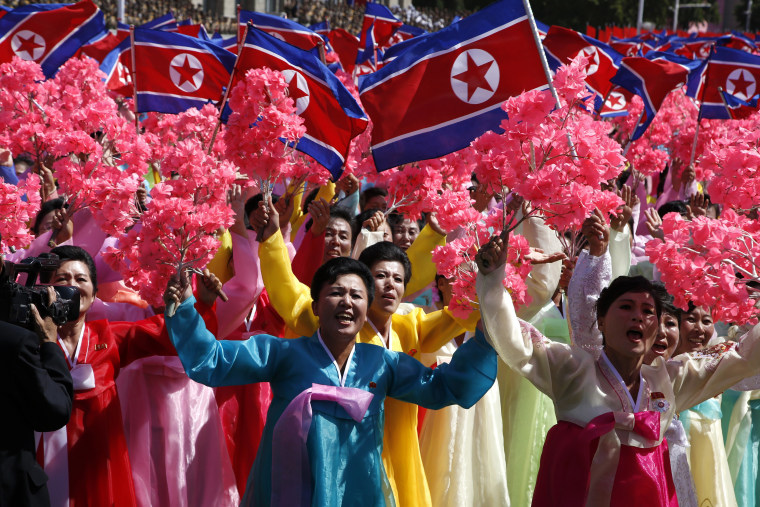PYONGYANG, North Korea — Tens of thousands of people gathered in Kim Il Sung Square on Sunday to watch as tanks and artillery rolled by next to goosestepping soldiers and marching bands in a major military parade to mark North Korea's 70th anniversary.
But it was the absence of any advanced missile systems that caught the eye.
North Korea watchers look to these parades as a rare opportunity to read into the mindset of the country's leader, Kim Jong Un, and the message Sunday was a nod to diplomacy.
As talks between President Donald Trump and Kim have stalled, a parade featuring intercontinental ballistic missiles could have been seen as a deliberate provocation. Trump thanked Kim for the lack of missiles on display in tweets Sunday.
The decision not to include the missiles came days after Kim expressed faith in Trump's efforts to settle a nuclear impasse between the two countries, according to South Korean officials who met with the North Korean leader on Thursday.
The trove of comments from Kim included a renewed commitment to a nuclear-free Korean Peninsula and to the suspension of all future long-range missile tests.
Kim presided over the parade on Sunday along with the head of the Chinese parliament and other high-level delegations from countries that have friendly ties with the North.
While Kim did not speak, the head of North Korea's parliament Kim Yong Nam stressed in an opening speech that Pyongyang has achieved military power and that the country's new focus would be on economic development.
The senior statesman called on the military to be ready to work to help build the economy.
The new line of putting economic development first has been Kim's top priority this year. He claims to have perfected his nuclear arsenal enough to deter U.S. aggression and devote his resources to raising the nation's standard of living.
Journalists from around the world were invited to the reclusive country to view the parade.
During a brief trip to Pyongyang — which included visiting a cosmetics factory and a cooperative farm — the message presented to reporters was one of economic empowerment, marking an apparent shift away from the anti-American messaging of the past.
Workers in the capital were being urged to use science, technology, innovation and economic growth as the means to truly "win."
The emphasis on the economy was also evident in the pageantry at Sunday's parade.
In addition to the full military spectacle, floats and displays also featured teachers, hospital staff and students. One display showed the map of a unified Korea with the dates of the three joint declarations the North has made with South Korea.

The combining of military and civilian sections is a familiar North Korean parade format. But this time there was no real trace of the country's nuclear weapons program that has been characteristic of past parades, including one before the Winter Olympics in February.
Last year, North Korea displayed its long-range missiles for the world to see, unnerving the White House and prompting a fiery exchange of insults from both sides, leaving many fearing war.
A historic summit between Trump and Kim in June — along with talks between North and South Korea —prompted hopes of a broader detente on the nuclear peninsular. But Trump's efforts have since stalled.
Both sides are now insisting on a different starting point. Washington wants Kim to commit to denuclearization first, but Pyongyang wants its security guaranteed and a peace agreement formally ending the Korean War.
Soon after Sunday's celebrations end, Kim will once again meet with South Korean President Moon Jae-in as the rival neighbors continue their efforts to improve relations.
Janis Mackey Freyer reported from Pyongyang, and Saphora Smith from London.


